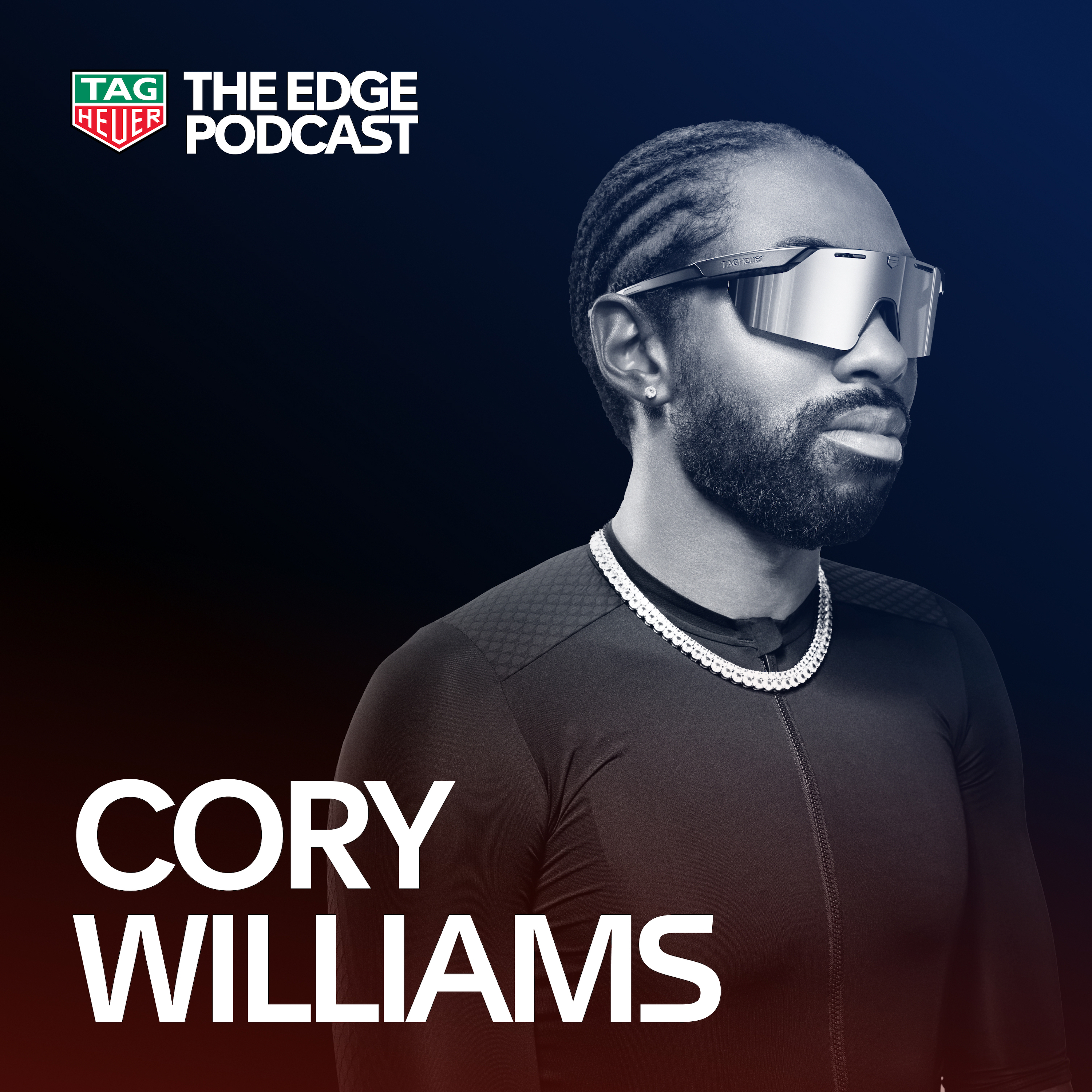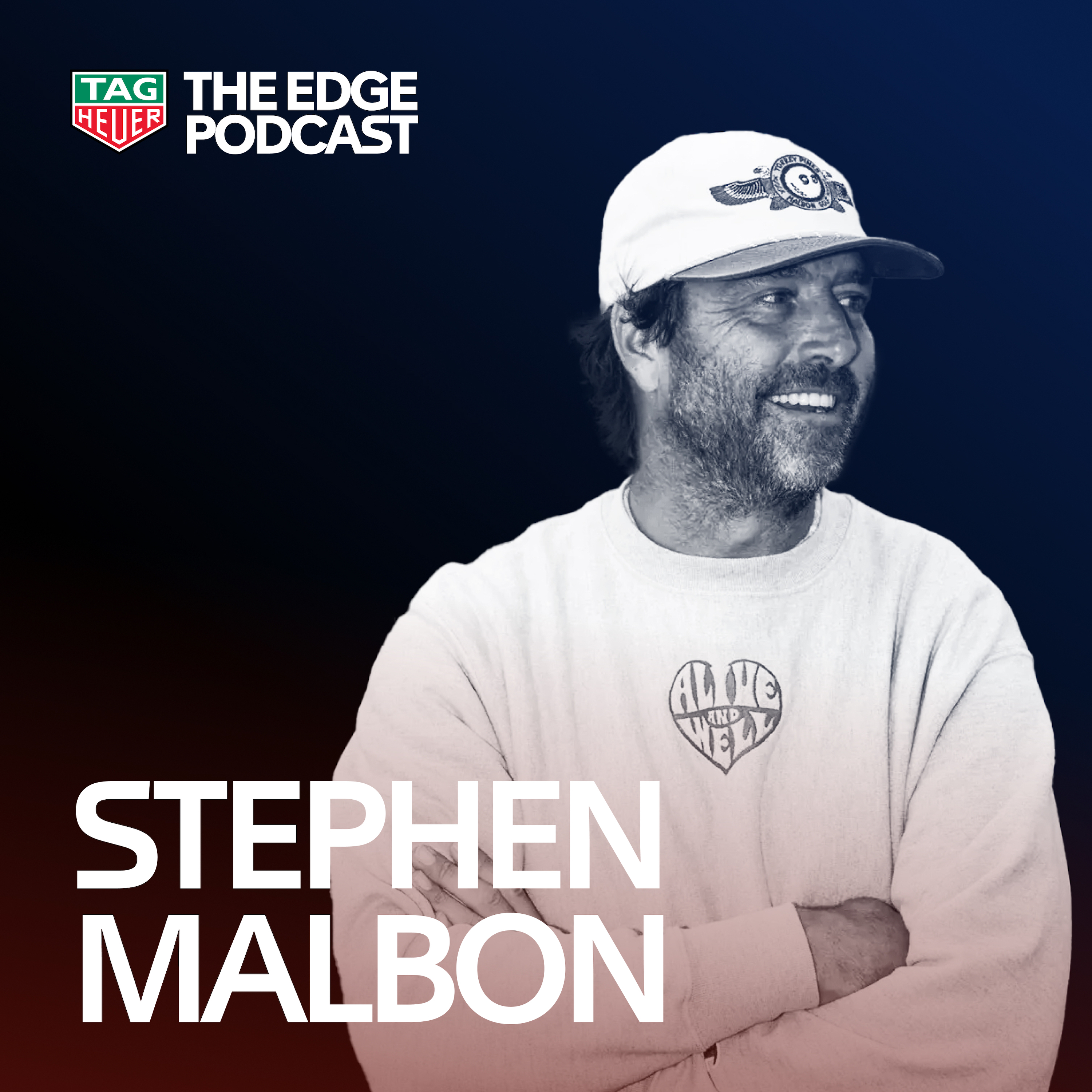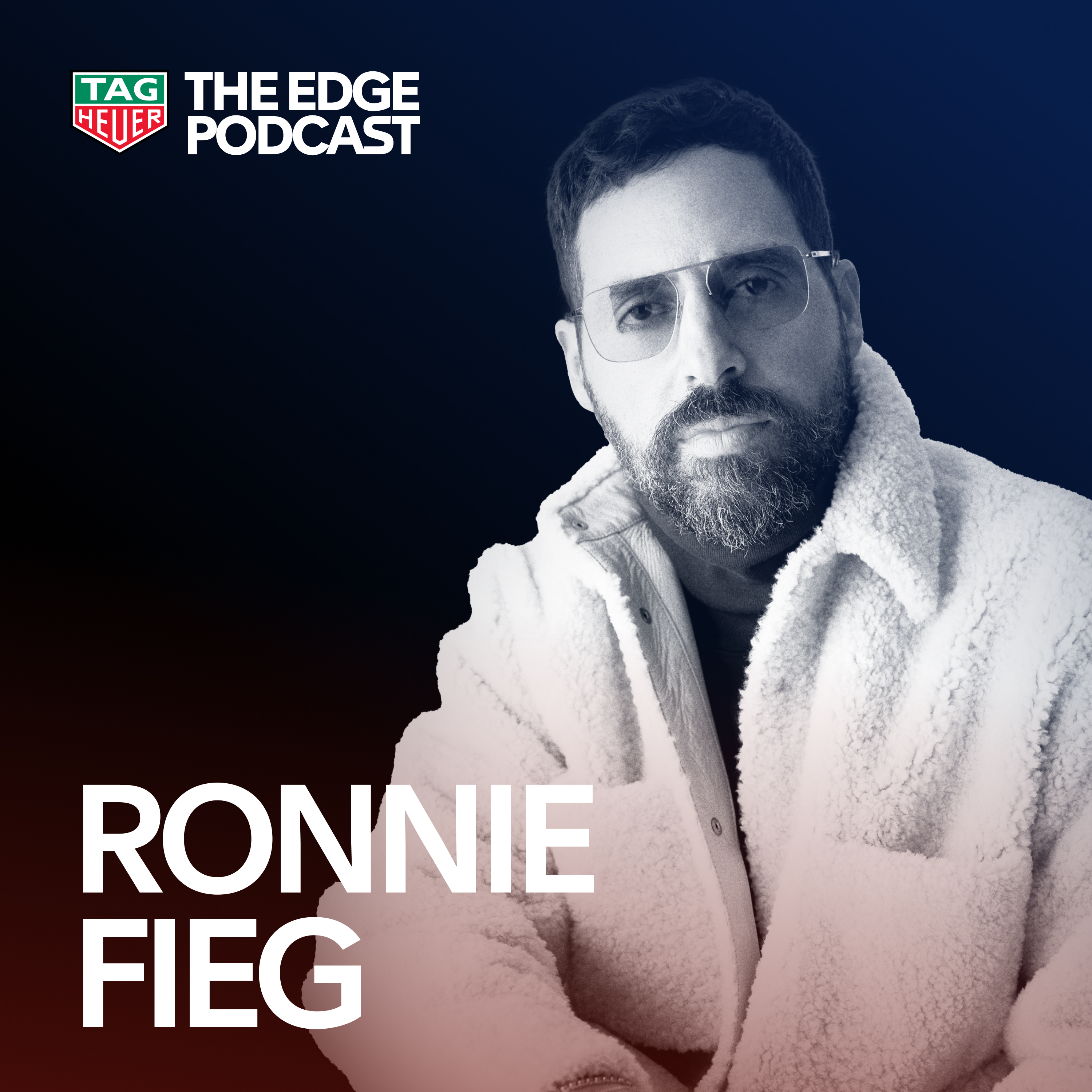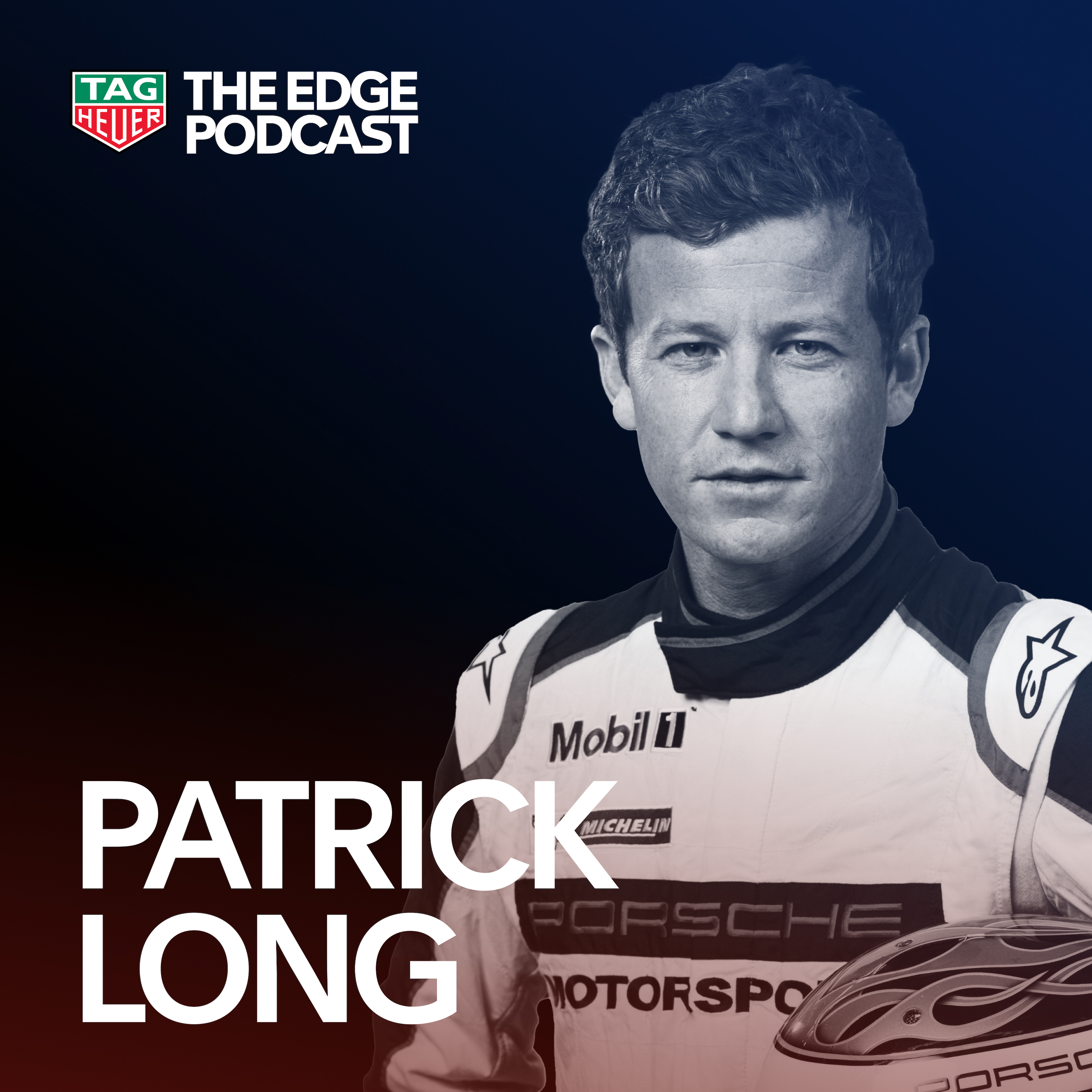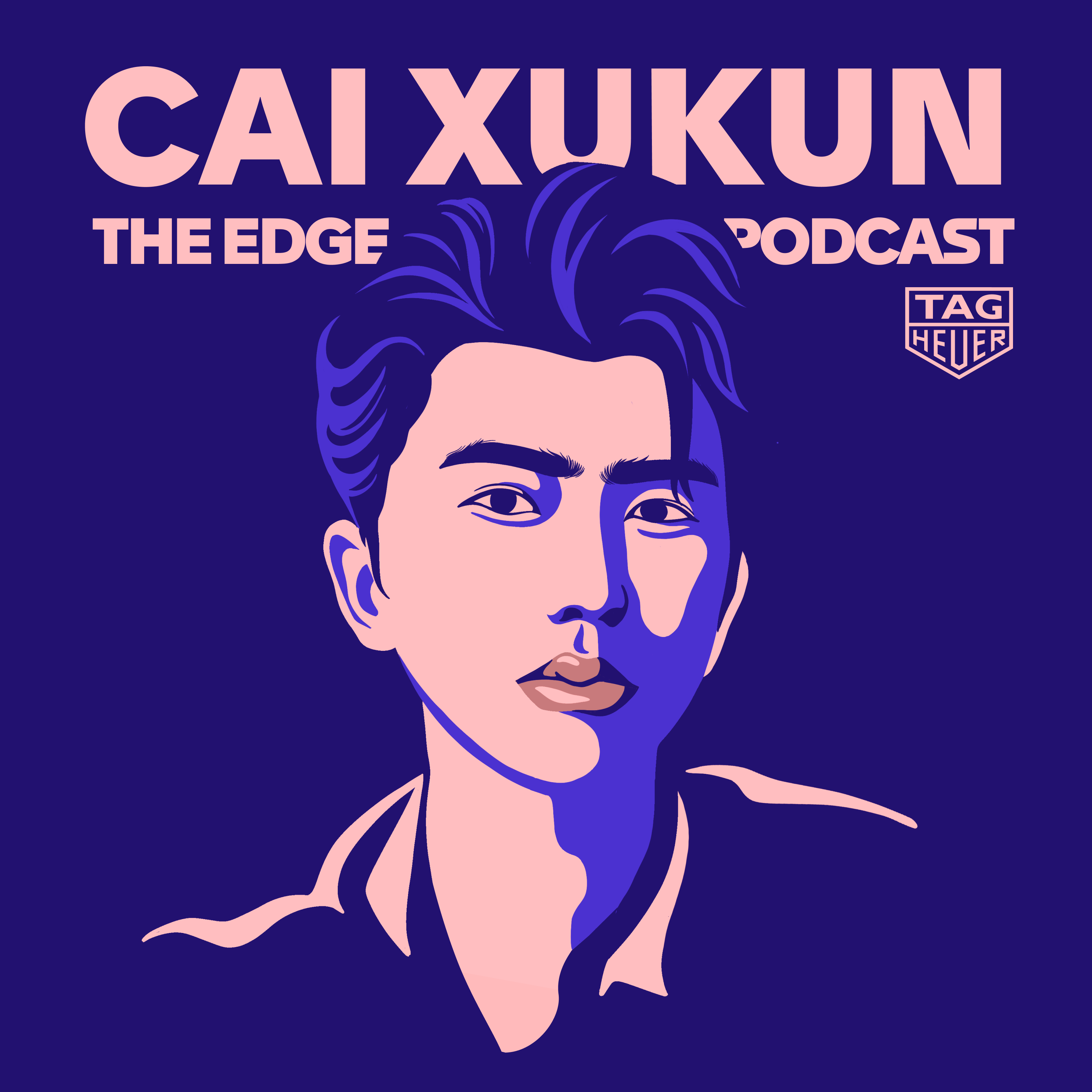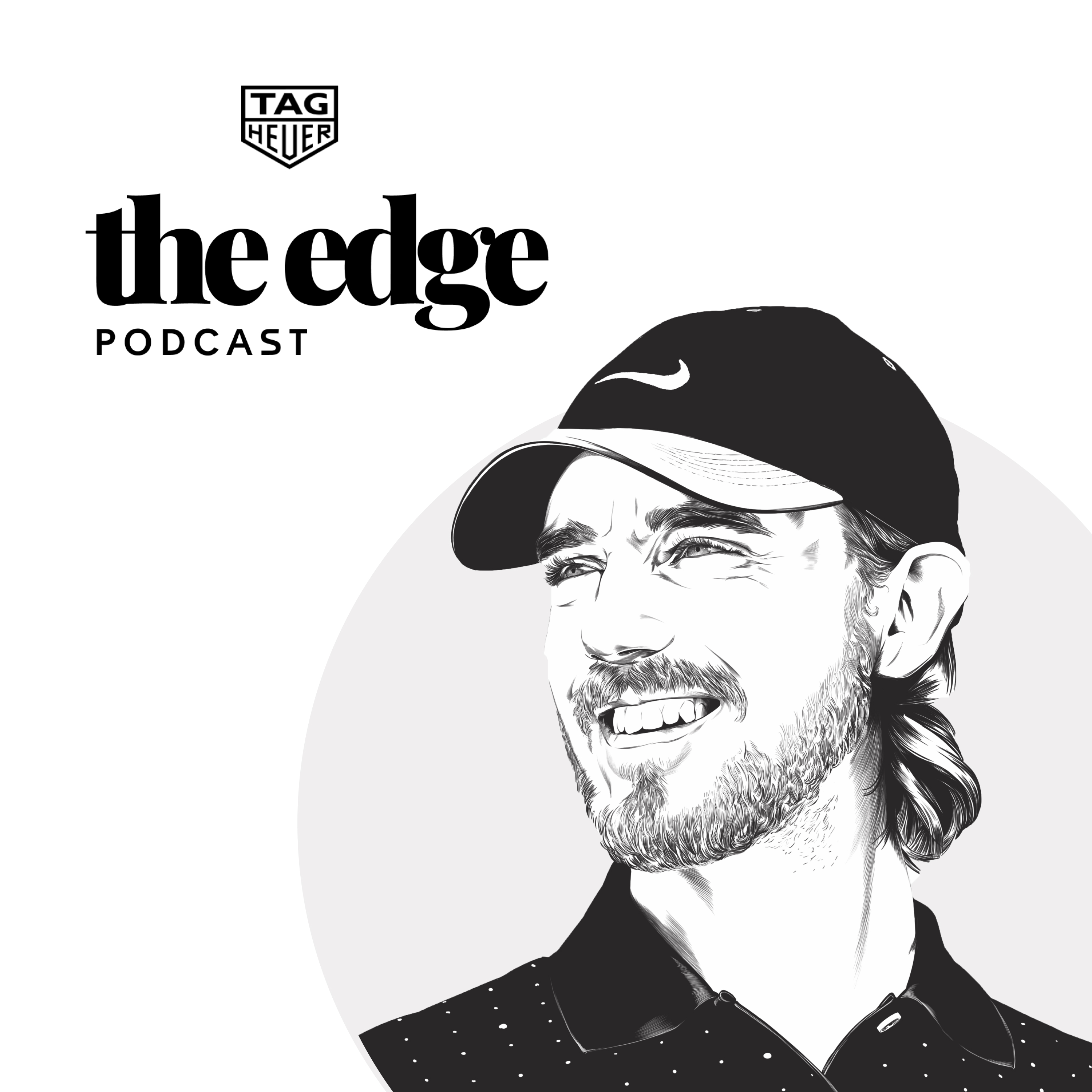Episode Transcript
[00:00:04] Speaker A: Welcome to the Edge, a podcast by Tag Hoyer. Our guest today is elite cyclist Corey Williams. In 2019, Corey established the UCI Continental team Legion of Los Angeles with his brother, Justin Williams. Their goal? To increase diversity and inclusion in cycling.
In this episode, Corey relives the key moments that shaped him, including his teams domination of the 2021 Tulsa Tuff. He also talks about what it takes to be an elite cyclist, his team's impact on the cycling community, and his vision for the future of the sport.
I'm your host, Naomi Schiff, and this is the Edge, a podcast by Tag Hoyer.
[00:00:54] Speaker B: We love to ask our guests when we get into these conversations where in the world they are in this moment. So where are you, Corrie?
[00:01:00] Speaker C: I'm in Los Angeles, California right now.
[00:01:03] Speaker B: Is that where you live?
[00:01:04] Speaker C: Yeah, I live. My whole family lives here. We're originally from Belize. It's a country in central America. So, yeah, we all moved here.
[00:01:14] Speaker B: Awesome. Well, for our listeners, if they had to ask the question, who is Corey Williams? What would you tell them?
[00:01:21] Speaker C: A cyclist and a father.
[00:01:24] Speaker B: Cyclist and a father. Okay, well, that's a great place to get started on a conversation. First of all, will you tell me where you grew up?
[00:01:31] Speaker C: I grew up in south central Los Angeles. It's near the University of southern California.
[00:01:38] Speaker B: Awesome. Well, you mentioned that you're a cyclist and a father, which are two incredible things. But we're going to dive into the cycling bit first. So I would love to ask you, what is it about cycling that you love, and where does your love for cycling come from?
[00:01:51] Speaker C: Yeah, growing up, my dad was a cyclist, so basically, I just wanted to be like my dad, just like a lot of other kids. And he used to do bike races on Sunday, and I used to just ride around on my little bike all day. They would literally have to call me inside to get dinner. So, yeah.
[00:02:06] Speaker B: Awesome. So you grew up watching your dad's cycle, and that essentially inspired you. Incredible. What, if anything, would you say, makes cycling different to any other sport?
[00:02:17] Speaker C: That's a good question. I played football, american football, for about eleven years growing up, and I also raced bikes. And I think the lack of breaks that you get while you're actually doing the sport is what makes it different.
[00:02:32] Speaker B: Relentless. So that sort of means that recovery is of the utmost importance for you to be able to just get back on and go again.
[00:02:40] Speaker C: Exactly.
[00:02:41] Speaker B: What, in your opinion, would you say it takes to be an elite cyclist?
[00:02:46] Speaker C: I think a lot of sacrifice with time. I think in cycling, it's an all day thing. Right? Like, you get up you go ride, and then recovery starts right after that. And that's literally, you know, what you eat, how you sleep, and a whole bunch of things. So I think you just have to have a lot of time to dedicate to the sport when it comes to.
[00:03:06] Speaker B: Preparing for an event. What goes into that? When it comes to how you prepare your mind and your body and even your team for a race?
[00:03:14] Speaker C: Yeah, I think a lot of practice in cycling is kind of weird because we don't go to a practice together like in other sports like basketball and football. You know, you show up and you go to a facility where you practice. But in cycling, we all practice separately and then we have to come together as a team on the day of a race. So, like, basically, I think a lot of, a lot of events, you know, when you do those, you get better at time and then that's how we, we prepare. We have to just show up and race and you have to be prepared for the next one. So, yeah, just repetitions.
[00:03:53] Speaker B: On the mental side of the sport and what it takes to keep your mind in it and stay strong. When you say that there is so little recovery period, how do you manage that?
[00:04:05] Speaker C: It's funny because I do a funny trick, right? I ride a trainer and I play FIFA. And like, the more tired I get, the more mistakes I start making. And that's where I really have to challenge myself to focus and really pay attention to what I'm doing. And I feel like it helps a lot when I'm in bike racing.
[00:04:23] Speaker B: So that's how you train your ability to stay focused and make sure that you can almost multitask and handle multiple challenges at once.
[00:04:31] Speaker C: Yeah.
[00:04:31] Speaker B: But when it comes to recovery from a mental perspective, what is your go to for that?
[00:04:38] Speaker C: I think sleep is the best recovery. I try to, when I'm done with the bike, I try not to think about it after that, you know, like, it's so mentally hard where, you know, I'm out focusing for 4 hours straight. You know, there's cars, there's potholes, there's a lot of things that you have to watch out for. And I feel like trying to cut that off as soon as you get off the bike is very important.
[00:05:00] Speaker B: Okay. Being able to switch off now, every athlete has an origin story or one key moment that has made them. What's yours?
[00:05:09] Speaker C: I think mine is my first bike race, actually. I got lapped maybe four times. And I just remember thinking like, there's no way that this can continue to happen. I'm so competitive that it just, like, you know, sparked something in me. It was a fire that's burning, and it's still burning to this day. Like, I'm not being laughed anymore, but I still want to always get better.
[00:05:32] Speaker B: That's a very wise thing to say, because often in your defeat is where you learn the most. Right? Failure can teach you so much. Now, I want to talk about the 2021 Tulsa Tuff, a race that your team dominated. Can you give us a little bit about, a little bit of context about the competition?
[00:05:51] Speaker C: Yeah, I remember that. So, basically, with COVID we haven't done any bike racing for months, and that gave me so much extra time to train that I was, like, better than I've ever been. And I remember all of our racing started around June, which we usually start in January. So I had a lot of time to prepare, and I just remember being so fit at that moment that the races were kind of easy for me. And, like, yeah, it was. It was an amazing atmosphere, and I think everyone was waiting to get back to racing. So it was really cool and building.
[00:06:26] Speaker B: Up to this big moment that, you know, where you highly anticipated for quite a lot of time. What was your mood like just before the race? If you can describe that, I was.
[00:06:36] Speaker C: Super nervous, super excited, just really ready to get back out there because, like, racing bikes my whole life, and I haven't been able to do it for almost a year. So it was just, like, a lot of emotions going into it. And I remember there was a little bit of, how can I say this? Some guys were talking smack and the other teams and everyone was just ready to go. So it was really cool to come out on top of that, were you.
[00:07:03] Speaker B: Able to prepare in the same way that you usually prepare, given COVID and everything leading up to the event?
[00:07:11] Speaker C: So basically, you know, with COVID I started out just being on the trainer, like, in the house a lot, and basically everyone was scared to go outside, so we didn't really go outside much. So I used Zwift to my advantage, and I think a lot of people that it's really hard to train inside. You know, you're not. You're not out looking at, you know, the beautiful views. You're literally in the house in a cave just, like, suffering on the bike. And I feel like I was really good at that. So I was, like, super prepared. Usually I'm doing a lot of racing before an event like Tulsa. So, yeah, I think the preparation was just a lot different.
[00:07:50] Speaker B: If you could describe stage two of the race, what was the atmosphere like? Then. And what state of mind did you approach it with, and how did you prepare for that moment?
[00:07:59] Speaker C: Yeah, with stage two, I was super motivated. I got second the day before, and my brother won. And I remember, like, telling him, I was like, you're not gonna pass me on the first day. Like, I was. I was convinced I was gonna beat him, and he beat me, and I was like, shit, this guy's actually really fast. And I know that this is my brother, but the second day, I had a sandwich, and it had cashews in it, and I'm allergic to cashews, so I had food poisoning, like, an hour before the race, and I was just, like, my stomach was hurting so bad. And I remember thinking to myself, I don't know how I'm gonna get through the race. So, yeah, there was a lot of trouble before that race.
[00:08:43] Speaker B: Wow, that sounds like quite a challenging state to be in just before getting on the bike. But it sounds like your preparation was vigorous and that you came to the event really prepared despite the challenges that you may have had. Halfway through, did you ever expect to dominate the race?
[00:09:01] Speaker C: No. I've gone to that race a good amount of times, and I would always be close, but I've never won a stage of it, and I don't. That was the first. That was also the first time the team was so dominant. So it was just a weird. A weird, like, moment to where, like, I couldn't. Almost couldn't believe it was happening.
But I just remember on that day, with, like, five laps to go, my stomach was hurting, and, like, at that point, everything was hurting, so I, like, didn't even notice it anymore. And I just kept thinking to myself, it's gonna be, like, the hardest race you've ever won. And I just kept repeating that to myself. Yeah, yeah. We came around with one lap to go, and I looked back, and there was no one behind me. It was a great win.
[00:09:47] Speaker B: Incredible. Well, it does sound like the cashews, and the effect it had on your stomach was one major obstacle. But were there any other surprising obstacles that you had along the way? I mean, I can imagine that those moments on the bike can be really, really long. So was there anything you remember vividly that was an obstacle for you during the event?
[00:10:07] Speaker C: My team did such a great job. There was about 170 people in the race, and I probably saw ten of them. So, like, it was. And that's why I tell you, it was so weird. It was just, like, they did such a good job that I really didn't have anything to worry about. They just, like, dropped me off to the finish, and it was. It was so easy that, you know, it was, like I said, it was just a weird time. It was. The event was. It was really easy. And in that race is never easy. And I think with all the preparation that we put in, it was just, like, perfect.
[00:10:44] Speaker B: So they drop you off for the finish, and they give you an easy job to do, the way you describe it, but I'm sure that it wasn't all just easy.
[00:10:52] Speaker C: Yeah.
[00:10:53] Speaker B: Describe the moment that you crossed the finish line. What did that feel like?
[00:10:57] Speaker C: It was amazing.
Like I said, I put so much work into it, and to cross the finish line first for the first time at the biggest race in the country, it was a great feeling. I feel like, you know, I look back, we got 1st, 2nd, third, and fourth, which is an amazing thing as well. And, yeah, I just remember thinking, like, okay, now the hard part is starting tomorrow because the third day is the hardest day. And I, like, had to be good that day, too. And when you're doing these events that are back to back to back, you have to be focused, and you have to get done with the race and then go recover. Right. Sometimes our races end at 10:00 p.m. At night, and you're not going to sleep until one, so sleeping, you're not getting really good sleep. And, like, I just remember racing back, like, getting some food and trying to go to sleep as fast as possible.
[00:11:48] Speaker B: So when you crossed the ultimate finish line or when did you cross the finish line, or did your teammates cross the finish line for you? You crossed the finish line.
[00:11:55] Speaker C: Which day?
[00:11:56] Speaker B: On the final? At the end.
[00:11:58] Speaker C: At the end. So basically it was another one. Two. I got second, and my teammate Tyler Williams won. So we won every single day of the race, which, like, I don't think has ever happened before.
And, yeah, I remember being in disbelief. Like I said, it's the hardest race in the country, and I've tried it plenty of times. And, yeah, I wasn't close to winning, so I was super happy. And then my dad is, like, he's super tough on us. Like, so basically, when I got over there, he had nothing to say, and that's a great thing.
[00:12:33] Speaker B: Awesome. Now, let's talk about the moment that you created lesion, a team that you started with your brother Justin. Why did you decide to create this team?
[00:12:42] Speaker C: I remember getting the lack of opportunities on other teams, no chances to prove myself, and basically, we got tired of it.
We wanted to do our own thing. We thought that we can do it better. And, yeah, it turned out to work. It's like sometimes when you bet on yourself, that's the right thing to do. So, basically, we had a team before it was called concept team, and Justin was on a pro team. I was on a pro team. He was going to retire, and then he ended up having more fun racing by himself. So basically, we wanted to make sure that our friends also had this experience of trying to do cycling in another way, like not being so strict and, you know, yeah, we're all competitive, but, you know, the extra stress of having team owners, team directors and things like that, we wanted to get rid of that and provide a home for our friends to also enjoy cycling in this new way that we found.
[00:13:43] Speaker B: From your experience, what would you say some of the pros and cons have been of working so closely with family?
[00:13:50] Speaker C: Oh, yeah. So a lot of arguments.
You know, we always sit down and try and come up with the best ideas, and sometimes, you know, you think your idea is better than the other one, and, you know, that can sometimes weaken butt heads over that. But I think the. The pros are, you know, is made a closer bond, and, you know, we can see the effect that we've had on people, and that's a great thing.
[00:14:17] Speaker B: Well, some of the incredible ambitions that you set out for with lesion was to increase diversity and inclusion in cycling. Have you felt that the team has had an impact on the cycling community?
[00:14:30] Speaker C: Yeah, I see a lot more people of color showing up to bike races, and, like, there's a cool story about that, that Tulsa in 2021, where there was two little black girls that came up to me and told me they came to watch the race because I was there. And that was so special to me because, you know, growing up in the sport, there's not always a lot of black people there or people of color. So, like, you know, right before the race, these. These two little girls coming up. To me, it was a very, very special moment for me.
[00:14:58] Speaker B: Incredible.
That's some of the highlights of doing and setting out with big ambitions like that. But have there been any hurdles along the way in the process of setting up lesion or even along the journey?
[00:15:12] Speaker C: Yeah, of course, there's a lot of naysayers, a lot of. A lot of hate that comes from people that, you know, are envious of you or don't think that you're doing things in the traditional way. So, like, there's been a lot of that to deal with, a lot of mental stuff that, you know, you have to get past. You can't make everybody happy. And, you know, as long as the family is happy, then we're okay.
[00:15:35] Speaker B: Would you say that, you know, one of those moments you just touched on there was when the two little girls showed up and said that because of the fact that there was representation, they showed up. Have there been any other moments like that that you've said, this is why it's all worth it?
[00:15:51] Speaker C: Yeah, there's a lot of moments like that nowadays. Like, there's a lot of races that we go to where there's people that ask for photos, ask for signatures, and, yeah, people, we sell jerseys and they sell out so fast. And the good thing about it is that the sizes that sell out are like, extra large and large, meaning that there's people that are getting into the sport that are buying these jerseys that sell out first. So that's just like showing the impact that we've had, that it's not traditional cyclists that are buying our stuff, it's the people that are trying to change their lives and get in shape. You know what I mean?
[00:16:29] Speaker B: Absolutely. That's incredible. What is your vision for the future of cycling?
[00:16:35] Speaker C: The vision for the future is a sustainable pathway in America so that if you don't want to live in Europe, that you can be a successful cyclist.
[00:16:47] Speaker B: Okay, I hear you. I hope that that will be the case, because me, too. When I was doing all my research into this, I wondered why you didn't participate in the likes of the Tour de France. And that might be a little bit to do with my lack of knowledge around cycling outside of Europe. But, yeah, it's prevalent in a lot of sports, isn't it?
[00:17:07] Speaker C: Yes.
[00:17:14] Speaker B: Now let's move on to talking about your career and move back to that. Would you say that there's anything that you are looking forward to the most for your career?
[00:17:24] Speaker C: The thing I'm looking forward to the most is I have a love of helping people, and I would like to see more people of color get into cycling and create these pathways where, you know, they are successful in our form of racing, which is criterium's shorter form of road racing. So I feel like when I can see a big crowd, people being paid and having success, that's what I look forward to.
[00:17:55] Speaker B: Amazing. We can't wait to see it. Is there one particular dream that you have yet to achieve?
[00:18:01] Speaker C: Yes.
I was supposed to go to the world championships last year, and last moment, we canceled. I would love to get on the start line of the world championships.
[00:18:11] Speaker B: Are you preparing for an event in this moment or what are you currently working on or draining your energy on?
[00:18:17] Speaker C: Yeah, I am going back to Belize. There's a race that is over 100 years old. It's one of the oldest races in the world, and it's the race I grew up on. We used to drive to Belize from los Angeles, which is like maybe 38, 40 hours to watch my dad do this race. And I'm going there in one week time. Or actually, I'm going there Saturday.
Uh, and the race is in two weeks. So I've been really focused in on that. I literally did a seven hour ride on Saturday. So, yeah, I'm preparing for that.
[00:18:54] Speaker B: Wow, 7 hours. That is a long time to be on a bike. But I understand you've, you've mentioned, you know, that preparation is so important and it is so relentless. So given the fact you have to keep going, basically, and there's no stopping, what is it that keeps you going? Is there. Is there something that motivates you specifically, or is that ever changing?
[00:19:16] Speaker C: I think just getting better. Getting better is what motivates me. I don't ever feel like I'm good enough, and I always have the spire to try and, like, be better. I want to be the best version of myself. I think that's what keeps me going.
[00:19:29] Speaker B: Is there one thing that you never expected to learn in your career that you've learned?
[00:19:35] Speaker C: That is a good question. I think that I've learned how to lose. I think that's what I've learned. I've learned that you can't always win, and it's okay. And I've always wanted to win everything I've done. And, yeah, I've learned that it's okay to lose sometimes. It's not your day, and you can be okay with that.
[00:19:56] Speaker B: Okay. So on that note, given the fact that maybe you learned something you didn't expect to learn, and again, it had to do with sometimes failure teaches you something.
What advice would you give to young, up and coming cyclists?
[00:20:11] Speaker C: I would tell them to make sure they have fun and do it with friends. You know, I think the beautiful thing about life is helping people. And when you're helping people, you know, it comes back double. So I think that if you can have fun, do it with friends and make sure you're helping people along the way, you'll go far.
[00:20:29] Speaker B: Are there any particular moments in your career that stand out to you? Like, moments that have felt maybe transformative?
[00:20:36] Speaker C: Yeah, I think some of my favorite moments is when you know a teammate that works for you like, basically pulls on the front the whole time. When they win, it's a very, very satisfying, beautiful thing. And I feel like when yeast, when you witness that as one of. Because I. They help me all the time. And when you see them win, that's something that changes how you feel about winning. You know, like something that is normal for me and is not normal for someone else. It's like when you see them experience that is. It's better than when you win. So I think that that's been crazy.
[00:21:17] Speaker B: It is such an interesting dynamic in cycling where one sort of sacrifices themselves for the other. And I guess that's sort of how you say you return the favors by having so much, you know, joy for them when they get the opportunity to win.
[00:21:32] Speaker C: Yes, exactly.
[00:21:34] Speaker B: Now moving on to Miami Blazers, your new team. What are you looking forward to the most with the new team?
[00:21:42] Speaker C: I think the challenge is I've had one of the best teams in the country for the last five years with Legion, and I think building another team that, you know, can potentially be the best team in America, I think that's what's exciting me the most. It's like, maybe I won't have that easy ride that I had until in 2021. But that's the beauty about it. You know, there's different challenges that come along with going to another team. So I think that's what I look forward to.
[00:22:09] Speaker B: Fantastic. Well, on that note, we come to my last question. We asked this question to all of our guests on the Edge podcast. It's sort of our little segment at the end, shall we call it? So the question is, Corey, what does the edge mean to you?
[00:22:26] Speaker C: I think the edge means that you are giving everything that you have to be the best that you can be.
[00:22:34] Speaker B: Short and sweet. I like it. Thank you very much, Corrie, for your time today. It's been lovely to talk to you and hear a little bit more about your story.
[00:22:43] Speaker C: Awesome. Thank you guys for having me.
[00:22:53] Speaker A: Thank you for listening to this episode of the Edge. If you'd like to hear more episodes just like this one, have a listen to our interviews with elite athletes like Fred Curley, Summer McIntosh, and Sidney McLaughlin.
[00:23:05] Speaker B: And if you enjoyed this episode, please.
[00:23:07] Speaker A: Don'T forget to subscribe or leave us some stars. It really does make the difference.
We also have to say a big thank you. Thank you to today's guest, Corey, for.
[00:23:16] Speaker B: Joining us on this episode.
[00:23:18] Speaker A: I'm your host, Naomi Schiff, and I'll be back next month with another episode of the Edge podcast by Tag Hoyer.
See you soon.
